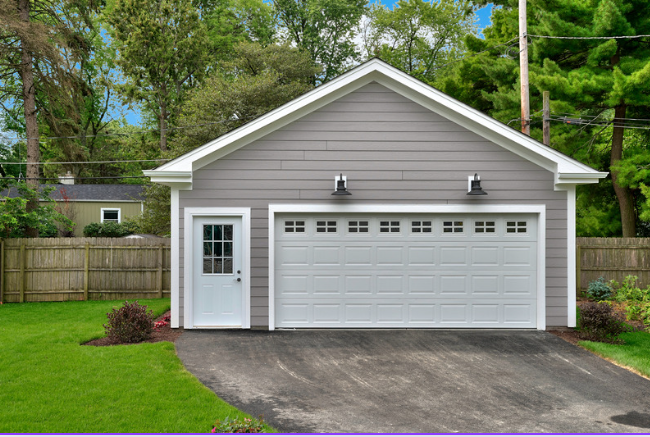When considering home improvements or repairs, the weight of your garage door is an important factor. It affects the operation, safety, and longevity of the door and its components. Here we’ll delve into how heavy a garage door can be, the types available, and their respective weights.
What Determines the Weight of a Garage Door?
Several factors contribute to the weight of a garage door. These include:
- Material: Garage doors are made from various materials such as wood, steel, aluminum, fiberglass, and composite. Each material has a different density and weight.
- Size: The dimensions of the garage door significantly influence its weight. Larger doors require more material, thus increasing their weight.
- Insulation: Insulated garage doors have additional layers of materials like foam, which add to the overall weight.
- Additional Features: Windows, double-layer materials, and reinforcement for wind resistance can also add weight.
Common Garage Door Weights by Material and Size
| Material | Size (Width x Height) | Average Weight (lbs) |
|---|---|---|
| Single-layer steel | 9′ x 7′ | 110 – 130 |
| Insulated steel (double-layer) | 9′ x 7′ | 150 – 170 |
| Premium insulated steel (triple-layer) | 9′ x 7′ | 190 – 210 |
| Wood | 9′ x 7′ | 130 – 160 |
| Aluminum | 9′ x 7′ | 80 – 100 |
| Fiberglass | 9′ x 7′ | 70 – 90 |
These weights are indicative for common residential garage doors. However, custom sizes and materials can significantly vary in weight.
How is the Weight of a Garage Door Measured?
To measure the weight of a garage door, you can use a scale designed for heavy objects or contact professionals like MS Garage Door Service for precise measurement. This ensures your door’s components are suitable for its operation.
Why is Knowing the Weight of a Garage Door Important?
Understanding the weight of your garage door is crucial for several reasons:
- Safety: A door that’s too heavy for its springs and opener can fail, posing a risk of injury.
- Performance: Properly matched springs and openers ensure smooth operation and extend the life of these components.
- Maintenance: Knowing the door’s weight helps in regular maintenance checks, identifying when parts need reinforcement or replacement.
Why Choose MS Garage Door Service?
Choosing MS Garage Door Service ensures expertise and reliability in managing all aspects of your garage door’s installation and maintenance. Our services include:
- Installation: Professional installation tailored to your home’s specifications.
- Maintenance: Regular checks and maintenance to keep your garage door in optimal condition.
- Repair: Quick and efficient repair services for all types of garage door issues.
We are committed to providing quality and customer-focused services to ensure your garage door functions perfectly and enhances your home’s security and aesthetics.
What Services Are Related to Garage Door Weight?
Several services are integral when considering the weight of your garage door:
- Spring Replacement: Adjusting or replacing springs to match the door’s weight.
- Opener Adjustment: Ensuring the garage door opener is suitable for the door’s weight.
- Regular Maintenance: Checking the alignment and balance of the door.
- Custom Solutions: Tailoring doors and hardware to your specific needs without compromising on style or functionality.
How Do Materials Affect the Lifespan of a Garage Door?
The choice of material not only influences the weight but also the durability and maintenance needs of a garage door:
- Steel: Highly durable and low maintenance; prone to dents but can be insulated for energy efficiency.
- Wood: Offers a classic look; requires regular maintenance to prevent decay and warping.
- Aluminum: Lightweight and rust-resistant; ideal for larger doors.
- Fiberglass: Low maintenance and resistant to corrosion; less common due to its lighter weight and flexibility.
How to Choose the Right Garage Door Based on Weight?
Choosing the right garage door involves considering the weight for several reasons:
- Spring and Opener Compatibility: Ensure the springs and opener can handle the door’s weight to avoid mechanical failures.
- Ease of Manual Operation: In case of power outages, a door that is not excessively heavy is easier to operate manually.
- Structural Integrity: Heavier doors require stronger support structures. Assess if your garage framing can accommodate it.
What Are the Safety Implications of an Incorrectly Balanced Garage Door?
An improperly balanced garage door can lead to:
- Increased Wear: Uneven stress on springs and cables can cause premature wear.
- Potential for Accidents: A door that fails to stay open or closes unexpectedly can be dangerous.
- Operational Issues: Difficulty in opening and closing, which may strain the door opener.
Conclusion
Understanding the weight of your garage door is more than a technicality; it’s a cornerstone of safe and efficient home maintenance. At MS Garage Door Service, we provide professional expertise to ensure your door not only meets your aesthetic and functional needs but also complies with safety standards. Whether you are exploring contemporary modern garage doors, needing to fix a garage door that won’t close, or seeking advice on garage door insulation, our team is here to help. Don’t hesitate to contact us for your garage door needs.



